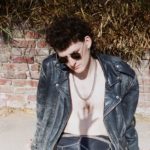HOSPITALITY
In a tribal hamlet near Karjat, a hut’s vacated
so our scout pack may rest up for the night.
We’re invited to dine with our displaced host;
milled grains cooked on a clay stove fueled
by wood chips and dry cow dung pats. Squatting
on hard-packed earth, we share canned offerings
that prove unpalatable to our patron’s brood;
their own are tinged with soot and generosity.
We avail of nature’s facilities out in the fields,
hand-pumping well water to brush our teeth;
then, turning down the wick of a soot-lined oil lamp,
we swing shut the thatched door of our mud chalet.
The next morning, Sunil risks the skills of the barber;
taking the high chair in the square by a banyan tree
under which the local elders convene, smoking biris,
chewing paan, to pontificate over disputes and tithes.
Two passing village belles stare and giggle at his shorn
embarrassment; hazing his bowl-cut as ruthlessly as we.
�
PLATFORM
Rustled and roused from slumber on lumber,
railway tracks cracking dawn’s amethyst glow;
we trusting travelers – we takers-on and
we choo-and-hiss thiss and that-at-at as
the Express eases into Guntakal Junction.
Holed up in my upper bunk, I’m the invisible Man –
eavesdropping on my parents’ hushed concerns
for the future – through the rumble and hoot,
I absorb a simplified message, the scale of
our journey embarked into the unknown.
All day yesterday, the towns rolled by; each
station stretching my tongue further afield
as I tried to pronounce it – Thane, Kalyan,
Karjat, Khadki, Daund, Kurduvadi, Solapur –
every grinding halt to the calls of tea-vendors,
shouting “garama-garam! hot hot chai!!”
poured with panache from weathered flasks.
While we slept, the train crossed
an invisible divide into the South –
we halt at a tropical mélange, vibrant
new palette of blue, red, mango;
indecipherable signs, a vibrant intensity
of chatter and crowd, the clatter and cluck
of local hoppers transporting poultry to market.
No more calls for chai – instead, the brewy aroma
of filtered chicory coffee wafts, milky and sweet –
the South’s true miracle!
Dad has stopped at the idli vendor, buying them
steaming, dipped in butter and served on banana leaves;
spicy coconut chutney, sambar, and some of that hot coffee
to wash it down – he returns with the steaming savory cakes
and the beaming smile and twinkle he reserves only for us.
He points to the hills that crest the outskirts of town –
resting among ancient Jain and Hindu temples
and a Catholic shrine, he says,
lie the century-old tombs of two Sufi saints.
It’s known that their poetry often served to keep
the peace between rioting Hindus and Muslims;
their tombs are now a popular daytime destination.
At a discrete distance along the platform,
a group of pilgrims roll up their prayer mats;
embracing wordlessly, and only love.
Here on the platform,
everything meets everything;
everyone touches everyone
moving, mingling, connecting,
we touch and then journey apart.
With a jerk and a shudder, we’re rolling again –
picking up fast past a waking wayside world;
past ox-carts piled high with produce
picked fresh by farmer’s hand – look,
Rickshaw Max is racing us to the approaching
railway crossing, and will likely beat us to it,
whooping and grinning as he must each day.
At the daily dairy depot, milkmen
attend cascades of fresh-boiled milk
poured into their beat-up canisters,
then strapped saddle-bag-style
on their bicycles. They clamber on,
fighter pilots on a morning sortie –
a practiced wobble, a gunning of speed;
puddles and potholes skillfully cleared,
they fly off into who knows what new day.
�
Homeward, Bound
Mumbai 2014
1
I’m thrust into a world of diesel fumes,
air brakes, and rickshaw honks;
the catcalls of vendors hawking
loose smokes, coffee, cola,
and currencies of every hue
to the cargo cult that throngs the
Arrivals terminal at Sahar Airport.
Veering clear of polyester pantsuits
and sugar-fingered kids,
I coax a squeaking luggage cart
past lolling cops, buses, touts,
and double-parked taxicabs;
following unwillingly the once-familiar
noxious trail of sewage, and brine.
Toxic gusts of lead, chrome,
and lung-lining particulates
waft in from the sweat shops that
populate Dharavi, Asia’s largest slum –
a sprawling maze of sheds and pathways
where children raised amidst shit and
sulfides pack happy-faced toys bound
for fast-food hooked girls and boys.
Labor is on clearance here
every day of the year.
The cost of my living hangs like
a cloud over those who live
without plumbing or mattresses;
yet tend hope, nurse dreams,
and gaze up nights
at the same stars.
2
Soon, I am ensconced in my
South Bombay family’s digs –
Darjeeling tea, home-made snacks,
afternoon naps, salt-lipped breeze.
But when I step out,
I’m reminded that all trace of me
and the connections I knew are erased.
I’ve spent decades in exile,
letting go of family and friends.
Old buddies hold court at lunches
set and served by inscrutable help;
chat rotates around German SUVs,
Bollywood galas, weekend digs
a speedboat dash across the bay.
I don’t quite click in this crowd;
our shared memories long replaced
by seasons weathered,
parents passed, children born.
Building a new life in the U.S.,
obsessed with survival, then success –
I slowly forgot them all;
and they forgot me, too.
Kids of the kids I played with
now rule our street corners,
fathers’ve handed over to sons.
I pass my old neighbor Remu – watch
him double-take, furrow-browed,
and rack his brain; stirring up
something that has to have happened
once upon a time.
Born in Bombay, Art Currim emigrated to Canada in his 20’s and has since led a multifarious life as a video game director, composer, industrial designer, and entrepreneur. He is these days a writer and poet with pointed opinions on displacement, immigrant identity, and the purpose of it all. He splits his life between Los Angeles and Vancouver, and dallies around the Rest of the World as if it were a used bookstore. Art’s work is published in Tia Chucha Press’ “Coiled Serpent” Anthology, Entropy, Yay!LA Mag, Dryland Literary Magazine, and The Women Group, among others.


 BACK TO ISSUE
BACK TO ISSUE



